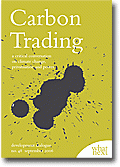Ideas into movement
Boost TNI's work
50 years. Hundreds of social struggles. Countless ideas turned into movement.
Support us as we celebrate our 50th anniversary in 2024.

Instead of reducing the extraction of fossil fuels and searching for other solutions, current carbon-trading policies, in practice, favour the further exploitation of these fuels.

Available for download from Dag Hammarskjold Foundation
To order free hard copy, send the mailing address to tni@tni.org. Please pay the postage in advance (for The Netherlands 6,75 euros; for Europe 11,55 euros) by credit card (Master Card of VISA), Bank transfer, or Paypal. Cheques are not accepted.
Editorial note
It is now accepted worldwide that the globe is warming to such an extent that the livelihoods of large swathes of the world’s population are under serious threat. Violent and frequent storms wreck people’s habitats; unpredictable weather drastically changes conditions for agriculture; new health threats emerge. As a result, awareness of global warming is increasingly infl uencing thinking in both the South and the North.
The irony is, however, that some of the responses to the global threat of climate change are likely to cause new and severe problems, which, in a worst-case scenario, could actually increase global warming. As this special report shows, this seems to be the case with carbon trading – a grandiose market scheme set up as the world’s primary response to the crisis of climate change.
The main cause of global warming is rapidly increasing carbon dioxide emissions – primarily the result of burning fossil fuels – despite international agreements to reduce such emissions. The trouble is that despite being aware of the serious situation, very few decision- makers are ready to tackle the problem at its roots. Instead of reducing the extraction of fossil fuels and searching for other solutions, current carbon-trading policies, in practice, favour the further exploitation of these fuels. Furthermore, new tree plantations, which are claimed as a means of mitigating the consequences of increased carbon dioxide pollution, often drive people out of their traditional living grounds and destroy biological diversity.
This special report forms part of the Dag Hammarskjöld Foundation’s What Next project. It focuses on carbon trading and is intended to influence current climate politics. In the debate on the Kyoto Protocol few actors have expressed a critical view. It is high time, for the purposes of debate and policy-making, to put the spotlight on the core problem – fossil fuel extraction and consumption.
This publication, therefore, takes a broad look at several dimensions of carbon trading. It analyses the problems arising from the emerging global carbon market pertaining to the environment, social justice and human rights, and investigates climate mitigation alternatives. It provides a short history of carbon trading and discusses a number of ‘lessons unlearned’. Nine case studies from different parts of the world provide examples of the outcomes – on the ground – of various carbon ‘off set’ schemes.
The publication project has matured over time. It was first discussed in connection with an early Dag Hammarskjöld What Next seminar in July 2001 on ‘Addressing Nanotechnology and Other Emerging Technologies in the ETC Century’.
The editor and main author, Larry Lohmann, who works with The Corner House – a small research and solidarity organisation located in Dorset, UK – pointed the Foundation to the increasing concern about carbon trading and the need for consolidation of critical perspectives. As a result, the Dag Hammarskjöld Foundation, in collaboration with several other civil society organisations, organised an international seminar in South Africa in October 2004. The seminar led to the ‘Durban Declaration on Climate Justice’ and gave rise to the Durban Group for Climate Justice, which is now playing an increasingly important role in climate politics. The meeting was also the starting point for the writing of this report. At various times in 2005 and 2006, Larry Lohmann worked on the project at the Dag Hammarskjöld Foundation as a Scholar-in-Residence.
Members of the Durban Group have played an important role in the process by contributing to and commenting on the text. An international network of independent organisations, individuals and people’s movements, the Durban Group is committed to helping build a global grassroots movement for climate justice, mobilising communities around the world and pledging solidarity with people opposing carbon trading on the ground.
This special report is a thorough, well-documented work, the purpose of which is to inspire critical and far-reaching discussion. Although the topic is complex, it is our hope that the wealth of information the report contains and the dialogue form in which it is written will contribute to broader understanding of the problem and deeper engagement in one of the most important issues of our time.
The Foundation’s What Next project, of which this special report is part, aims to contribute to the discussion of crucial development issues in the next few decades. A diverse group of concerned people has come together to engage in intense dialogue. The project is a sequel to the Foundation’s What Now: Another Development initiative of 1975. The What Next deliberations are being compiled in several publications. In addition to this special report, there will be a number of volumes of What Next papers. The first, entitled Setting the Context, was published in July 2006. Volume II and III will follow. The What Next Report 2005-2035, to be published before the end of 2006, draws on the major debates of the What Next process. It presents a number of possible scenarios for the next three decades, and includes concerns about various ‘solutions’ to climate change such as large-scale ‘geoengineering’ schemes as technological fixes to the problem.
Olle Nordberg, Niclas Hällström, Robert Österbergh
Available for download from Dag Hammarskjold Foundation